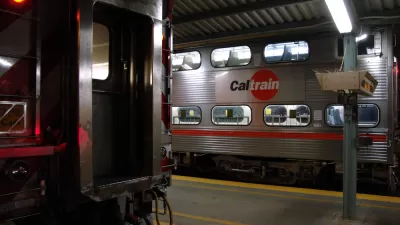An agreement has been reached to electrify Caltrain from San Jose to San Francisco, using early investment High-Speed Rail funds, but will Bay Area HSR opponents take notice?
[Updated February 15, 2017.]
The memorandum of understanding approved this week by the Metropolitan Transportation Commission board calls for local and regional entities to provide funding for just over half the $1.5 billion agreement. The state's High Speed Rail Authority would provide $706 million from the 2008 Prop 1A bond monies.
"The agreement was heralded by various Metropolitan Transportation Commission board members, local officials and Caltrain advocates as a huge step toward electrification, a project that the cash-strapped agency is banking on for long-term financial stability. With electrified tracks and a new signal system, Caltrain would be able to operate more trains and, as a result, generate more revenue," reports Gennady Sheyner.
"This really is the foundation for electrification and, really, for the future of Caltrian," said MTC board Chair Adrienne Tissier, who also chairs Caltrain's board of directors.
Will the agreement appease Peninsula high speed rail critics?
"For the rail authority, the new agreement provides a way to appease some of its critics on the Peninsula, where opposition to the project has been particularly fierce. Palo Alto in December adopted as its official position a call for termination of the high-speed rail project. It has also joined Menlo Park, Atherton and a coalition of nonprofit groups in a lawsuit that challenge's the rail authority's environmental analyses for the San Francisco-to-Los Angeles project," writes Sheyner.
The Authority has decide whether to agree to the MOU at it April 5 meeting.
Thanks to Palo Alto On-line news
[The post was updated to reflect the correct, $706 million, figure in the lead paragraph.]
FULL STORY: Plan to modernize Caltrain sails through regional commission

Maui's Vacation Rental Debate Turns Ugly
Verbal attacks, misinformation campaigns and fistfights plague a high-stakes debate to convert thousands of vacation rentals into long-term housing.

Planetizen Federal Action Tracker
A weekly monitor of how Trump’s orders and actions are impacting planners and planning in America.

Chicago’s Ghost Rails
Just beneath the surface of the modern city lie the remnants of its expansive early 20th-century streetcar system.

Bend, Oregon Zoning Reforms Prioritize Small-Scale Housing
The city altered its zoning code to allow multi-family housing and eliminated parking mandates citywide.

Amtrak Cutting Jobs, Funding to High-Speed Rail
The agency plans to cut 10 percent of its workforce and has confirmed it will not fund new high-speed rail projects.

LA Denies Basic Services to Unhoused Residents
The city has repeatedly failed to respond to requests for trash pickup at encampment sites, and eliminated a program that provided mobile showers and toilets.
Urban Design for Planners 1: Software Tools
This six-course series explores essential urban design concepts using open source software and equips planners with the tools they need to participate fully in the urban design process.
Planning for Universal Design
Learn the tools for implementing Universal Design in planning regulations.
planning NEXT
Appalachian Highlands Housing Partners
Mpact (founded as Rail~Volution)
City of Camden Redevelopment Agency
City of Astoria
City of Portland
City of Laramie




























